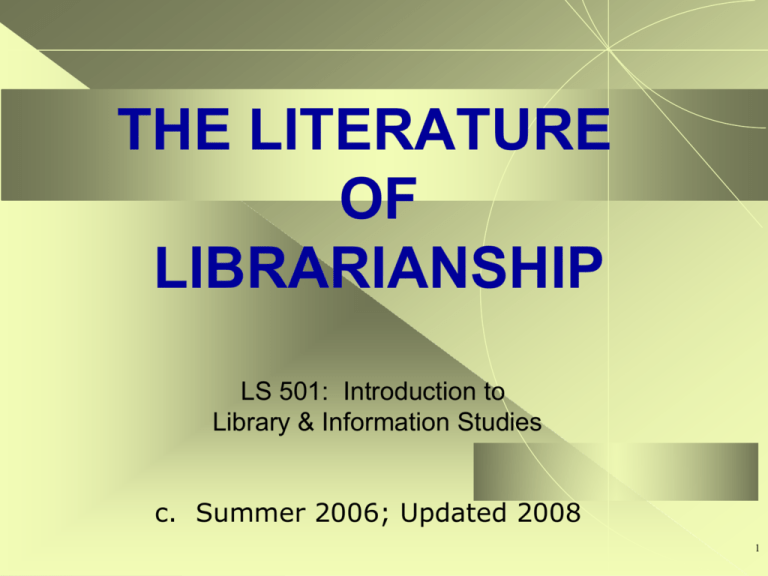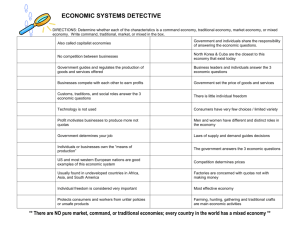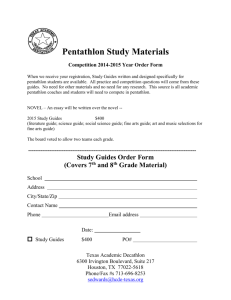What Is a Library? - Shelton State Community College
advertisement

THE LITERATURE OF LIBRARIANSHIP LS 501: Introduction to Library & Information Studies c. Summer 2006; Updated 2008 1 BUT FIRST……………… Some handy-dandy tips Definitions Googling URLs Domain names Backtracking Search engines & Subject guides Pathfinders Evaluating websites 2 Finding Definitions and Understanding Terminology ODLIS http://lu.com/odlis/ Googling definitions www.google.com Enter definition “word or phrase” Google options 3 My name is URL …………………. URL = Universal Resource Locator = an Internet World Wide Web Address. Domain name = unique address on the Internet; also referred to as Internet name or Internet address; domain names are also referred to as Uniform Resource Locaters or URLs. Domain Name Servers (DNS): DNS is used to point a domain name to the server where the actual site is stored. The name server details are provided by the web hosting providers. eg:.suffixes IP = Internet Protocol Because the Internet is based on IP addresses, not domain names, every Web server requires a Domain Name System (DNS) server to translate domain names into IP addresses. 4 Domain Names Domain name = a name that identifies one or more IP addresses. Tthe domain name microsoft.com represents about a dozen IP addresses. Domain names are used in URLs to identify particular Web pages. For example, in the URL http://www.pcwebopedia.com/index.html, the domain name is pcwebopedia.com. Every domain name has a suffix that indicates which top level domain (TLD) it belongs to. There are only a limited number of such domains. For example: Every domain name has a suffix that indicates which top level domain name (TLD) it belongs to. There are only a limited number of such domains. gov - Government agencies edu - Educational institutions org - Organizations (nonprofit) mil - Military com - commercial business net - Network organizations ca - Canada ; uk = United Kingdom ; au = Australia, etc. See the list of Domain Extensions and the countries they coincide with in the Quick Reference section of Webopedia. Also see Registering a Domain Name in the Did You Know section of Webopedia. 5 BACKTRACKING THE URL Why backtrack? To locate root source To locate information about the web page and its authors/producers/sponsors www.laurenpressley.com/projects/millennials/paper.doc www.laurenpressley.com/projects www.laurenpressley.com 6 SEARCH ENGINES & SUBJECT GUIDES Use a Search Engine, which is a machine-generated searching technique that locates words within webpage titles, addresses, and text. This technique is best used to locate a great deal of information or "hits" on a particular topic or to locate a specific title that is already known (as in the title of a webpage, song, article, etc.). Be aware that search engines may locate thousands or hundreds of thousands of poor choices. For information on search engines and how they operate, go to the Search Engine Watch site. Google, which arranges hits by relevance, is a highly recommended search engine. Use a Subject Guide when you need more assistance. A Subject Guide is usually developed and maintained by professional librarians or information specialists who organize web sites by specific subject headings. Because the content is reviewed by some means, there is usually higher percentage of relevant hits on search terms. Some Subject Guides may be machinegenerated, based on the number of times a term appears in a document. Most college and public libraries that are online provide recommended subject lists of web resources. Use a source that includes Review Sites. These sources provide professional reviews to websites, which means the content has been reviewed and evaluated according to criteria for good communication on the WWW. These sources are useful in identifying the best and most reliable resources among millions available. Some Search Engines and Subject Guides have review or recommended sections. For the best results in a comprehensive search, use more than one search engine, subject guide, or review source. Each search tool has "help" sections which provide more detailed information to help improve searching. http://www.sheltonstate.edu/content2.aspx?PageID=499#rec%20search%20engines 7 EXAMPLES OF SUBJECT GUIDES Toolkit for the Expert Web Searcher (Ensor/LITA) http://www.ala.org/ala/lita/litaresources/toolkitforexpe rt/toolkitexpert.htm Librarians’ Index to the Internet: Websites You Can Trust (UC/Berkeley) http://lii.org/ UA Libraries Subject Guides www.lib.ua.edu/subjguides 8 PATHFINDERS A subject bibliography designed to lead the user through the process of researching a specific topic, or any topic in a given field or discipline, usually in a systematic, step-by-step way, making use of the best finding tools the library has to offer. Pathfinders may be printed or available online. See also: topical guide. (from ODLIS) Particularly good for library instruction/orientation in school and academic libraries Helps librarians organize their presentations, understand a subject field, and prepare for students/library users Common service provided by librarians for their users (and for each other) How can we find examples online? 9 TYPICAL PATHFINDER (Print & Electronic) Guides to the literature Dictionaries, encylopedias, glossaries Subject headings, search terms (now keyword searching often supersedes the need for subject headings) for finding books Indexes & databases Important journals in the field Almanacs & statistical sources Specialized reference works or topics (e.g., Library of Congress, history of librarianship, services for young adults) Other resources (people, places, organizations, etc.) 10 LIS PATHFINDERS Library & Information Science http://web.lib.usf.edu/ref/ifrank/guides/lis.html Internet Public Library http://www.ipl.org/div/pf/ 11 Evaluating Websites See “How to Find Good Information on the Web” on the Shelton State library website, also linked to your LS501 syllabus page online. http://faculty.sheltonstate.edu/%7Edgrimes/howtoev al.01.html 12 Why is it important to know the literature of the field? To identify the core beliefs, understandings, history, and content in the field To understand the traditions, language, ethics of the field To identify key authors and titles, historical and current, in the field To identify resources that point to other publications in the field (e.g., guides to the literature, review journals, bibliographies, etc.) To know when to choose and when to reject publications (or other resources) in the field To identify all formats in which resources in the field are published (both formal and informal) Understanding the literature of a field is what makes someone an expert in the field and/or an expert subject bibliographer/cataloger. 13 What is meant by “literature of the field”? Record of scholarship within a particular field “Classics” Authors Publishers/Producers Titles Languages Historical vs. cutting edge Formal vs. informal sources National & international (languages) 14 Types/Sources of Literature of a Field Formal Sources Books (monographs) Periodicals & other serials Abstracts, indexes and databases Reference works “Classics” in the field Dictionaries, handbooks, encyclopedia, directories, etc. Metadata & bibliography Associations, societies, agencies, organizations Informal Sources Conference papers, proceedings (“live” and electronic) Associations, societies, agencies, organizations Blogs? Grey literature & the Invisible College (http://www.greynet.org/ ) 15 What Is Grey Literature? Material which might not be formally published, such as institutional reports. It can be difficult to trace, but the MOPS Unit can help. http://www.lib.gla.ac.uk/welcome/jargon.shtml Working documents, pre-prints, research papers, statistical documents, and other difficult-to-access materials that are not controlled by commercial publishers. Also spelled Gray literature. http://lanic.utexas.edu/project/laoap/glossary.html Non-conventional literature (NCL, also called ‘grey literature’) comprises scientific and technical reports, patent documents, conference papers, internal reports, government documents, newsletters, factsheets and theses, which are not readily available through commercial channels. NCL specifically does not include normal scientific journals, books or popular publications that are available through traditional commercial publication channels. en.wikipedia.org/wiki/Grey_literature 16 How do you find out what the literature of the field includes? Where do you find it? Textbooks, reading lists Classes (professional education) Professional associations Indexes & databases (which periodicals are included) Reference works 17 How To Find Good Information on the Web http://www.sheltonstate.edu/Faculty05.aspx?PageID=869 18 COMING UP NEXT ……………… 5000 years of library history! 19


